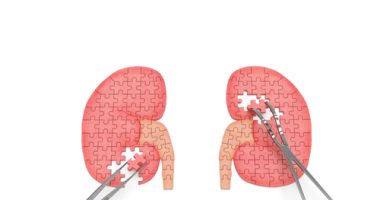Ramipril Clinical Trial Aims to Bring Approved Treatment to Alport Children: an Interview with Dr. Oliver Gross

While many Alport syndrome patients have heard about the possibility of preventing kidney failure with drugs called ACE inhibitors, the medications are approved only for adults in final disease stages.
But one man has been working for years to come up with the evidence to prove the treatment is effectively and safely preventing the progression of Alport disease, and can be used in children to prolong their lives. Dr. Oliver Gross is leading a clinical trial of the ACE inhibitor ramipril in children with early Alport disease with the hope that an approval for the treatment will make its use more widespread.
“Alport syndrome has become a treatable disease,” said Gross, a professor at the University Medical Center Göttingen in Germany, when Alport Syndrome News interviewed him about the clinical trial.
The road to human health goes through mice
Alport syndrome has been a part of Gross’s academic career. Nearly 20 years ago, he was part of a team of researchers at the University of Cologne in Germany who observed that children with Alport syndrome who were treated with ACE inhibitors seemed to ward off progression of the disease. It also appeared as though the treatment could prevent kidney failure.
ACE inhibitors were developed to treat high blood pressure by acting on a hormonal system called the renin–angiotensin system in the kidneys. But children with Alport usually do not have high blood pressure.
“Back then, most of us did not believe that a complicated genetic disease such as Alport can be treated with ACE inhibitors,” Gross said. “Lucky for us and the patients, ACE inhibitors work unexpectedly well. We now know that ramipril protects the Alport kidneys by lowering the glomerular filtration pressure, by blocking the local angiotensin-system of the podocyte and [through] secondary events such as the tubulointersitial scarring [a type of kidney damage].”
At the time, a study in humans was not feasible, with too few patients and too many parameters to consider. Instead, Gross and his colleagues started studying mice with Alport mutations. A study, published in 2003, clearly showed the benefits of treatment in early life.
While mice who received ramipril at late disease stages lived as long as untreated mice, those who started treatment at an early age and continued throughout life lived more than twice as long. The proteinuria, or leakage of proteins into the urine, was also milder in the treated mice.
But mouse studies do not get drugs approved for human use. Even though ramipril has been approved for years by the U.S. FDA for adults with high blood pressure under the brand name Altace (including late-stage hypertensive Alport patients), clinical trials were needed to get the drug approved in a new patient group.
Regulatory hassles
Gross has taken on the responsibility for the clinicial trial process. While most academic researchers who conduct trials collaborate with a pharmaceutical company, the EARLY PRO-TECT Phase 3 trial (NCT01485978), which is still recruiting patients, is sponsored by the German Ministry of Research and Education, with the University Medical Center Göttingen providing the financing.
This brings its own set of challenges, particularly with funding and regulatory knowledge. “My great respect for the expertise of [the] pharmaceutical industry in conducting clinical trials has risen tremendously since we started our study,” Gross said.
Ethical concerns
But economic obstacles aren’t the only challenges. Because Gross is working with children who have a rare disease, and children may react differently to drugs than adults, the regulations are much more complex than for adult studies.
The rarity and slow development of Alport syndrome presents another problem, making it difficult to find patients. To get enough data, researchers increased the treatment period in the study from three to six years, putting an enormous strain not only on patients and their families, but also the treating physicians.
“As you can imagine, the safety and ethical aspects of treating very young children for up to six years with ramipril versus placebo are challenging,” Gross said.
But why a clinical trial?
The study enrolls patients in early disease stages. In Alport, this means the presence of microscopic amounts of blood in the urine (usually present at birth in Alport patients), or microalbuminuria, which is the leakage of microscopic amounts of the plasma protein albumin. The patients included in the study are from 2 to 18 years old.
Once patients enroll in the study, they become randomized to receive either ramipril or a placebo. Although observational studies — particularly one that followed three generations of patients over more than two decades — are showing that the drug is effective in preventing disease progression and renal failure, regulations require that a clinical trial compares the treatment to a placebo.
This may be one of the toughest issues Gross faces in his work to get the treatment approved. Parents signing up their child for the clinical trial face the risk of having their child receive the placebo. In the case of ramipril, the choice to participate in a trial is particularly difficult, since it is possible to find a doctor that may prescribe the drug outside of its approved use — a practice called off-label prescription.
But without this comparison, there is really no way of knowing if the treatment is truly effective and — most importantly — safe for long-term use in children. And Gross thinks that an approval would bring the treatment to many more patients, a point he discussed in a publication describing the goal and design of the trial.
“ACE-inhibitors are very effective, off-patent and inexpensive. Therefore, they can be broadly used to treat children with Alport’s even in developing countries. To bring ramipril on-label would further increase its use to benefit patients with Alport,” Gross said.
“I think, treating children and young patients with a rare severe disease without scientific evaluation of the long-term outcome is unethical,” he added. “Alport syndrome has become a treatable disease, but patient care needs to be improved and new medication to be evaluated.”
A focus on safety
To allow parents who don’t want to risk putting their child on a placebo, the trial also includes a so-called open-label group, in which all patients receive ramipril. This group also includes patients who have reached Stage 2 Alport disease and have started leaking proteins into the urine. The group allows researchers to include more patients to study the safety of the treatment — a very important goal of the trial.
On a final note, we asked Gross if there is anything he would like to say to patients and families of people with Alport disease. His answer conveyed a clear message.
“Please take part. Any clinical trial is a great chance to improve care for patients and improves the ‘standard of care’ and the knowledge of Alport syndrome,” he said. “Please help to make treatment for Alport better and better.”
The trial is expected to be completed in February 2019. Gross and his colleagues in Germany are also recruiting adult and pediatric Alport patients and healthy volunteers for an observational study (NCT02378805) of ACE inhibitors.







Comments
Melanie
How do we get in touch with this study? Are they interested in any US children with AS?
Magdalena Kegel
Hi Melanie,
The study only runs in Germany. To get in touch with the study leader, contact Dr. Oliver Gross at [email protected]
Melanie
We have tried to no avail.